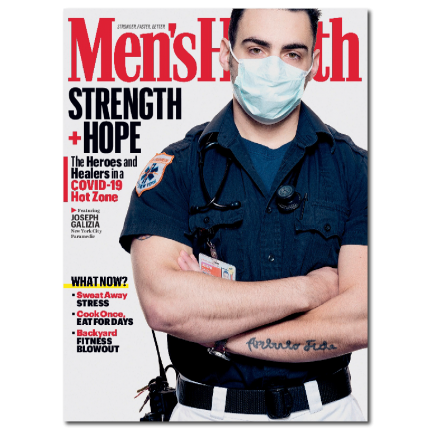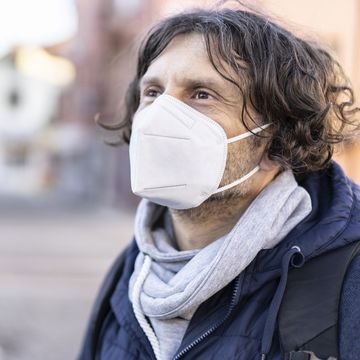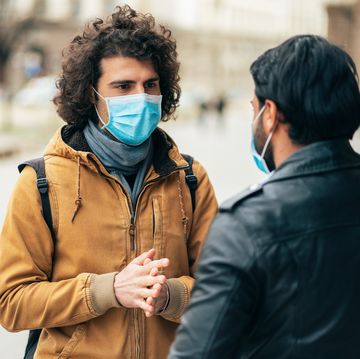When you see someone who's not wearing a mask, you might have the urge to scream at them. Or at least strongly suggest they step six feet away from you. But it's not going to be as helpful as you might hope.
We've all gotten the memo that the safest way to halt the spread of COVID-19 is to stay inside and practice social distancing. But when you do go outside, you should wear a mask, both to prevent yourself from getting sick and from also unknowingly passing along the disease to others. You’d think we’d all know that at this point, but we've also all noticed people on the street, in the stores and sometimes at our socially-distanced backyard family get-togethers walking around maskless like it's 2019 or something.
From stubborn masculine pride to reactionary political ideology, the reasons why people are ignoring the advice of practically all medical experts are as myriad and unknowable as the human psyche itself. And one need only look at the horrifying, and rapidly spreading, numbers of infections and deaths from COVID-19 to recognize the cost of this carelessness.
Shaming total strangers, if not family members, into wearing masks has become popular of late. It might be cathartic, but it's ultimately not effective, according to Daryl Appleton, Ed.D., a New York-based psychotherapist and Fortune 500 Executive Corporate Consultant who specializes in helping her clients amend unproductive behaviors.
"If you bully, threaten or guilt someone to change, at worst you will invoke primal defense mechanisms that will end in aggression," she says. There are more than enough viral videos of strangers reacting poorly to mask shaming to prove her point.
Whether it's because they think the virus is a hoax or that masks are for wimps, people have their reasons for not wanting to wear them. That's not to say these are good reasons (they're not), but they are reasons nonetheless. While you don’t need to respect those reasons per se, you do have to respect what they mean to people, and also respect that it can be tough for people to let their justifications go. "Fear will generally keep the mind closed. When we invest deeply in a feeling, we feel it with our whole body and mind, and to admit that we may be wrong or have to change can be an incredibly scary thing," says Appleton.
It is of course, very frustrating that people not wearing masks are ignoring overwhelming evidence and putting themselves and others (and you) at risk. But it's important to maintain perspective and empathy, even for those we might be mad at. Appleton points out that anyone, even a person who considers themselves enlightened and informed, can dig their heels in.
"Consider how difficult it is to change yourself, and you will have a much better understanding of your chances of changing someone else. Rationally, we know sweets are bad for us. But that doesn’t stop us from eating them. We crave things that make us feel better and provide us comfort," she says. "Emotions are the most powerful thing in the world. It is why people stay in relationships longer than they should, talk down to themselves, or engage in harmful behaviors. Feelings are so powerful that they can sway us to make decisions we normally wouldn’t and follow people we would never engage with. It is at the crux of marketing campaigns and political movements." That’s what you’re up against.
So what can you say to someone who’s not wearing a mask?
Instead of shaming, try to elevate the conversation by allowing for dialogue and centering the conversation about your reaction and not their actions.
"While our first inclination may be to yell 'dead man walking,' that may not inspire the desired result. Using 'I statements' helps to keep the conversation in an assertive tone while keeping the focus on finding a solution," says Appleton. "Things like 'I’m not ready for hugs yet, but I am so happy to see you' or 'it would really make me feel better if you had your mask on or if we could continue this conversation at a further distance' are both examples of assertive ways to voice your feelings regarding social distancing."
If they don’t comply, you can’t force them, of course. “The best thing you can do is facilitate an environment of safety and openness," says Appleton. She explains that it’s only when someone feels safe to say what they think and feel that they can start to get out of that fear-based mentality, which allows them to explore other options.
And if your environment of openness or “I” statements don't work, your best option might be to walk away and take it as a teaching moment. After all, we can all be hard-headed, and any one of us can become too obstinate to listen. (Take a moment next time you become defensive about something, and make sure you're not becoming that which you dislike.)
"If you find yourself shutting down or shutting down the other people around you, feeling internal rage or becoming argumentative, or if people who are close to you are saying they feel like they can't speak to you on certain topics," says Appleton, "you may want to take some time and do some soul searching, starting with the question 'what am I afraid of?'”
If you want someone else to be less rigid in their thinking, it's always good to practice that yourself. Give it a try, and the next time you run into someone without a mask (and there will definitely be a next time) you'll have a better sense of how to get them to take care of themselves, and everyone else.














